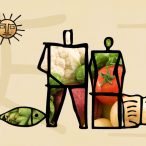English · Español

16 October 2014 | News | Food Sovereignty
Food and Democracy - October 16: World Food Sovereignty Day
Download: MP3 (2.4 Mb)
On October 16, the world commemorates World Food Sovereignty Day with mobilizations and statements by the peasant movement, rural women, pastoralists and artisanal fisherfolk. The latest report by the Right to Food and Nutrition Watch states that this human right is threatened by the domination of food systems in the hands of a few transnational corporations.
“Food security and human rights remain deeply threatened by concentration of land ownership, corporate domination of food systems and policy incoherence", stated the Right to Food and Nutrition Watch in their 2014 report, launched two days ago at the FAO´s headquarters in Rome, Italy.
The report (available here) commemorates the tenth anniversary of the passing of the Right to Food Guidelines that enshrined adequate food as a basic human right.
The report analyzes a series of fundamental political processes and highlights the increase of corporate influence on international governance around food and nutrition, which supposes a threat for the global struggle for the right to adequate food.
On the one side, the increase of the power of drinks and food multinational corporations on what ends up on the plates of consumers has caused an increase in the consumption of unhealthy processed food, something that has contributed to the rise of obesity and malnutrition, both in developed and developing countries.
On the other side, agricultural and financial investors are taking over natural resources and undermine food sovereignty and the rights of local communities and small-scale farmers.
Said practices are promoted and accepted by governments in the name of "development".
For example, an estimated 1 million hectares of land have been acquired in Mali in the past years, driving many peasant communities away from their livelihoods.
The expansion of mining in Sweden and its impact on indigenous and peasant populations show that land grabbing is a global phenomenon.
The Watch calls governments to show their political will to address the inequalities of the food systems and demands that the right to food is realized in consistent food, nutrition, energy and trade policies.
The report includes an interview with former United Nations Special Rapporteur on the Right to Food, Olivier De Schutter (2008-2014), where he points out: "on the one hand, the Guidelines are a remarkable instrument, extremely detailed and highly legitimate. At the same time, they do not seem to be used very frequently by policy makers to shape their decisions. There is much more we could do with them than has been until now”.
Around the globe, social movements and organizations are celebrating World Food Sovereignty Day with mobilizations, demands and statements.
"Food sovereignty is the right of the world´s peoples to produce and consume healthy food.
Food cannot be reduced to a commodity in the hands of transnational corporations", reads La Vía Campesina International´s call, that includes the resistance and rejection of transnational corporations. This federation was the first to use the concept of Food Sovereignty, widely accepted today.
La Vía Campesina celebrates this day of solidarity, resistance and mobilization each year, aiming to raise awareness of civil society about the risks faced by the Food Sovereignty of the Peoples today.
La Via Campesina highlights that it is important "to strengthen the alliance between those who work in the countryside and those who work in the city. The human right to food should not only refer to availability; it should also ensure that the available food is wholesome, healthy, and culturally appropriate".







